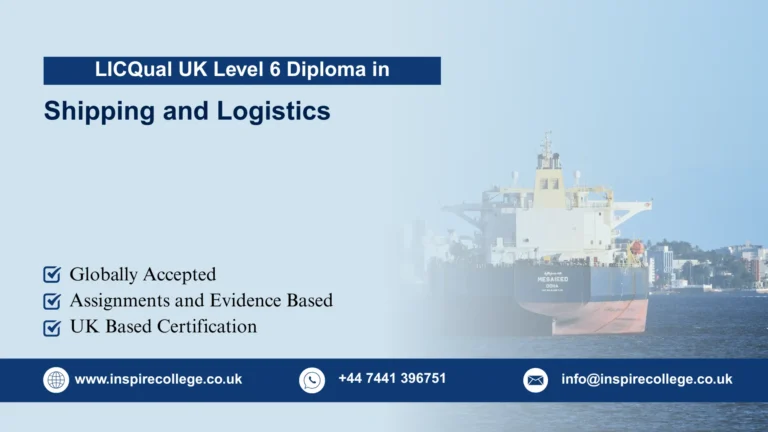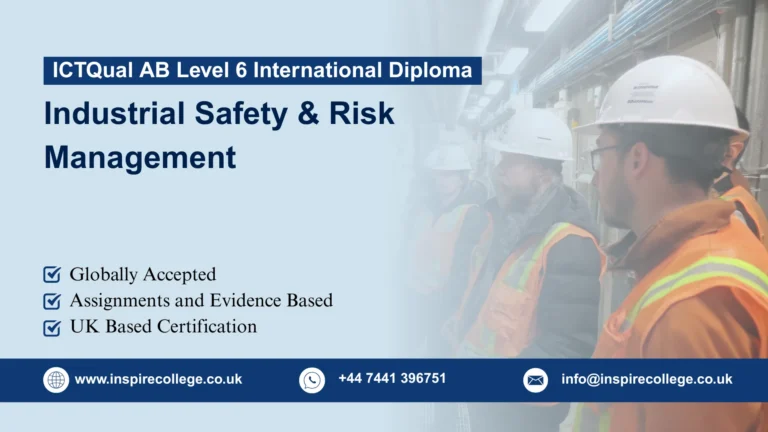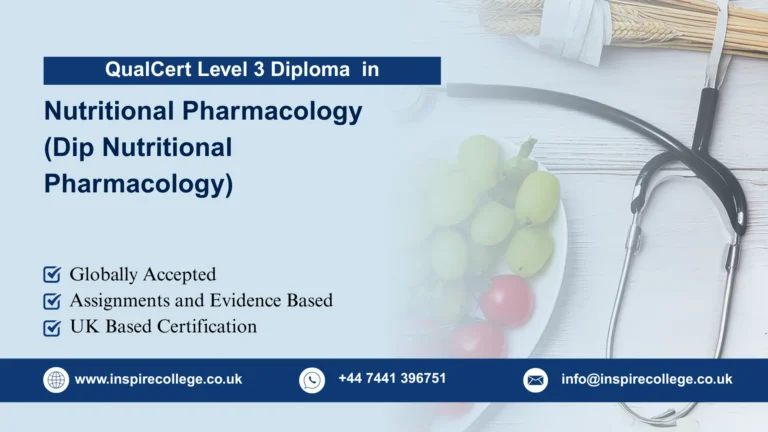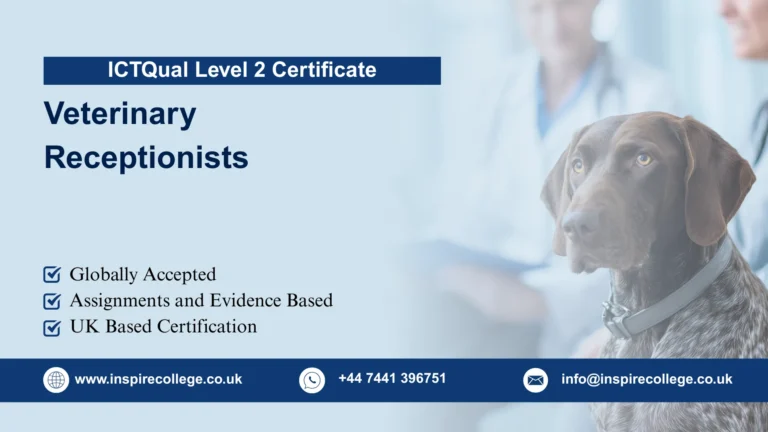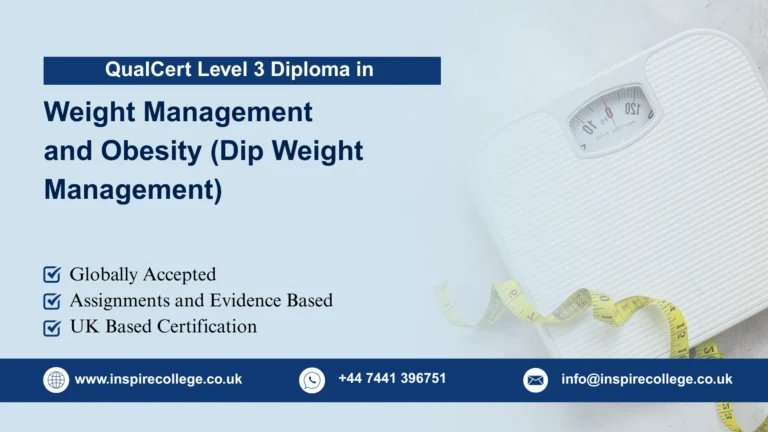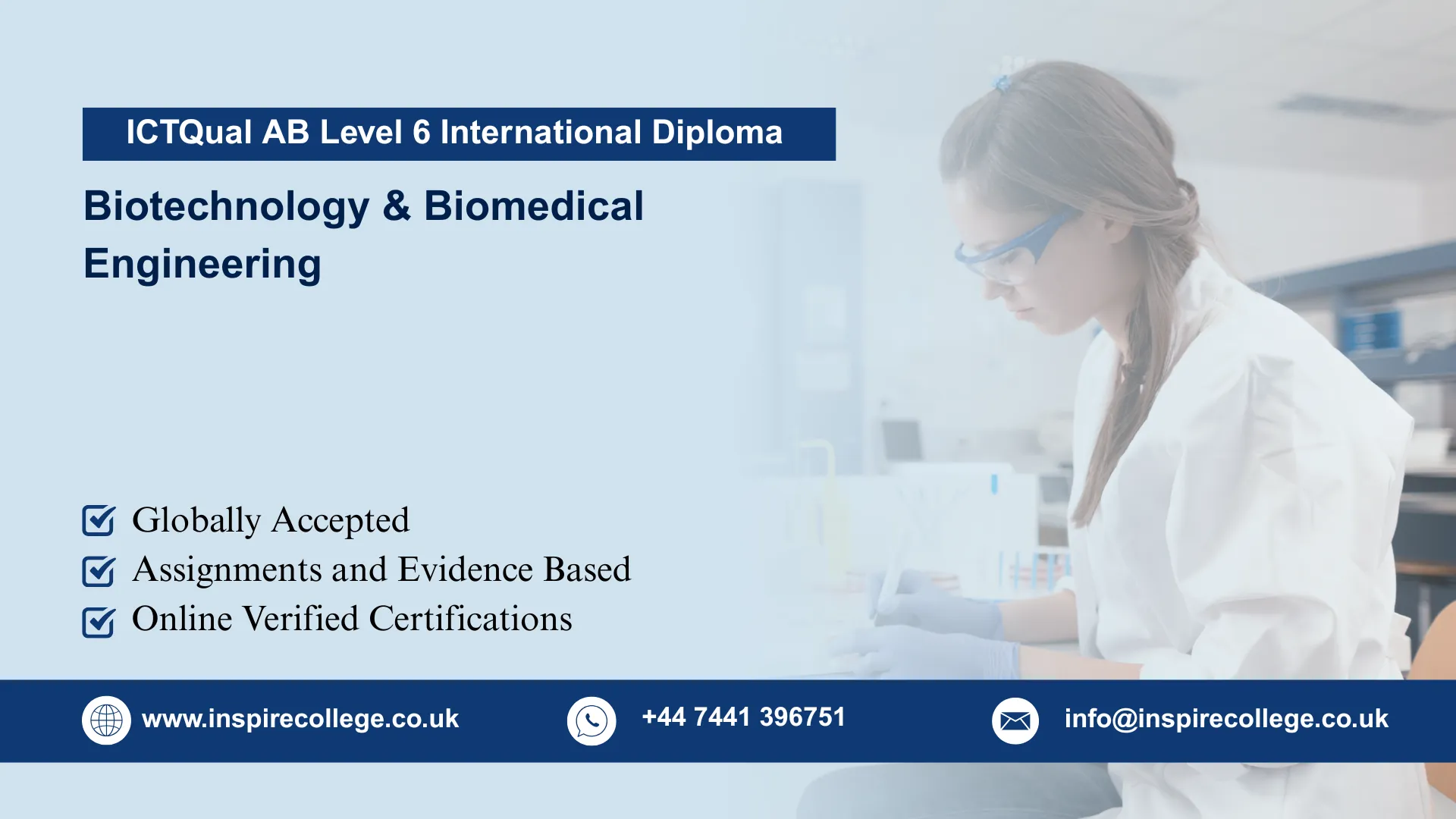
ICTQual AB Level 6 International Diploma in Biotechnology & Biomedical Engineering
In today’s rapidly evolving healthcare and life sciences sectors, expertise in biotechnology and biomedical engineering has become indispensable. The ICTQual AB Level 6 International Diploma in Biotechnology & Biomedical Engineering equips learners with advanced knowledge and practical skills to excel in these cutting-edge fields. This program bridges the gap between theoretical understanding and real-world applications, preparing learners for impactful careers in research, medical technology, pharmaceuticals, and healthcare innovation.
Designed for both fresh entrants and experienced professionals, this comprehensive 3-year program spans 360 credits, offering a rigorous curriculum that covers molecular biology, genetic engineering, bioinformatics, medical device design, and biomedical systems. Learners gain hands-on experience through laboratory simulations, project-based assignments, and industry-relevant case studies, fostering competencies that are immediately applicable in professional settings.
Upon completion, graduates will possess a deep understanding of biotechnology principles and biomedical engineering practices, coupled with critical thinking, problem-solving, and technical proficiency. They will be well-prepared to contribute to advancements in healthcare technology, biomedical research, and biotechnology innovation, making them highly competitive in the global job market.
Whether you are starting your journey in life sciences or seeking to enhance your professional expertise, the ICTQual AB Level 6 International Diploma in Biotechnology & Biomedical Engineering offers a pathway to advanced knowledge, practical skills, and internationally recognized certification, positioning you for success in an era of scientific and technological breakthroughs.
The ICTQual AB Level 6 International Diploma in Biotechnology & Biomedical Engineering is designed to cater to both fresh learners and working professionals seeking advanced expertise in biotechnology and biomedical engineering. To ensure success in this rigorous 3-year, 360-credit program, candidates must meet the following entry requirements:
Age Requirements
- Applicants must be at least 18 years old at the time of registration.
Educational Requirements
- A Level 5 diploma or equivalent in biotechnology, biomedical sciences, life sciences, or related fields.
- Candidates with A-levels, high school diploma, or equivalent qualifications in science subjects may also be considered.
Professional Experience
- For experienced professionals, a minimum of 3–5 years of relevant work experience in biotechnology, biomedical engineering, healthcare, or related industries is preferred.
- Practical exposure to laboratory work, research, or clinical settings is advantageous.
English Language Proficiency
- Proficiency in English is required for academic comprehension and communication.
- Applicants must provide evidence of IELTS 5.5 or equivalent, or demonstrate prior education in English.
Related Course: Candidates interested in expanding their interdisciplinary skills may also consider the ICTQual AB Level 6 International Diploma in Biomedical Technology & Medical Devices, which complements this program.
This entry requirement framework ensures that learners are adequately prepared to engage with the course content, successfully complete assessments, and thrive in both academic and professional settings. Meeting these standards positions candidates for a rewarding career in the fast-growing fields of biotechnology and biomedical engineering.
Mandatory Units
This qualification, the ICTQual AB Level 6 International Diploma in Biotechnology & Biomedical Engineering, consists of 36 mandatory units.
Year 1: Foundation in Biotechnology & Biomedical Engineering
- Introduction to Biotechnology and Biomedical Engineering
- Fundamentals of Human Anatomy and Physiology
- Principles of Molecular Biology and Genetics
- Biochemistry for Life Sciences
- Microbiology and Infection Control
- Laboratory Safety and Quality Assurance
- Principles of Pharmacology and Therapeutics
- Mathematics and Statistics for Biomedical Applications
- Computer Applications in Biotechnology
- Communication Skills for Science and Healthcare Professionals
- Introduction to Research and Evidence-Based Practice
- Ethics and Professional Conduct in Biomedical Sciences
Year 2: Intermediate Biotechnology & Biomedical Engineering Applications
- Genetic Engineering and Recombinant DNA Technology
- Cell Biology and Tissue Engineering
- Clinical Biochemistry and Diagnostic Techniques
- Immunology and Serology
- Instrumentation and Analytical Methods in Biotechnology
- Microbial Biotechnology and Industrial Applications
- Molecular Diagnostics and Laboratory Techniques
- Bioprocess Engineering and Biomanufacturing
- Data Analysis and Biomedical Informatics
- Health and Safety in Biomedical Laboratories
- Leadership and Teamwork in Scientific Practice
- Applied Research Methods and Experimental Design
Year 3: Advanced Specialisation and Professional Application
- Advanced Molecular Biology and Genomics
- Advanced Immunology and Clinical Applications
- Biomedical Device Engineering and Design
- Advanced Bioprocessing and Biopharmaceutical Production
- Stem Cell Technology and Regenerative Medicine
- Bioinformatics and Computational Biology
- Clinical Trial Design and Regulatory Compliance
- Advanced Laboratory Techniques and Automation
- Quality Management and Risk Assessment in Biomedicine
- Emerging Technologies in Biotechnology and Healthcare
- Research Project / Dissertation
- Professional Practice and Practical Competency Assessment
The ICTQual AB Level 6 International Diploma in Biotechnology & Biomedical Engineering equips learners with comprehensive knowledge, practical skills, and professional competencies essential for a successful career in biotechnology, biomedical engineering, and healthcare innovation. The program emphasizes both theoretical understanding and hands-on application, ensuring graduates can contribute effectively in academic, research, and industrial environments.
Year 1: Foundation in Biotechnology & Biomedical Engineering
Introduction to Biotechnology and Biomedical Engineering
- Explain key concepts, principles, and applications of biotechnology and biomedical engineering.
- Identify current trends and innovations in life sciences and medical technologies.
- Recognize the interdisciplinary nature of biotechnology and its role in healthcare solutions.
Fundamentals of Human Anatomy and Physiology
- Describe the structure and function of human body systems.
- Apply anatomical and physiological knowledge to biomedical contexts.
- Interpret physiological data relevant to medical and research settings.
Principles of Molecular Biology and Genetics
- Analyze the structure, function, and regulation of DNA, RNA, and proteins.
- Demonstrate understanding of Mendelian and molecular genetics principles.
- Apply genetic knowledge to experimental and clinical scenarios.
Biochemistry for Life Sciences
- Explain biochemical pathways and molecular interactions in cells.
- Apply biochemical principles to laboratory investigations.
- Analyze the role of enzymes, metabolites, and macromolecules in cellular processes.
Microbiology and Infection Control
- Identify microorganisms and their relevance to health and disease.
- Apply infection control and aseptic techniques in laboratory settings.
- Evaluate microbial contamination risks in biomedical environments.
Laboratory Safety and Quality Assurance
- Demonstrate knowledge of laboratory safety protocols and regulations.
- Implement quality assurance practices in experimental procedures.
- Assess potential hazards and ensure compliance with safety standards.
Principles of Pharmacology and Therapeutics
- Explain pharmacokinetics and pharmacodynamics of key drugs.
- Assess therapeutic applications in clinical and research contexts.
- Apply principles of drug action to experimental design and evaluation.
Mathematics and Statistics for Biomedical Applications
- Apply statistical methods to analyze experimental and clinical data.
- Use mathematical modeling in biomedical problem-solving.
- Interpret quantitative results to support research findings.
Computer Applications in Biotechnology
- Utilize bioinformatics tools and software for data analysis.
- Demonstrate proficiency in data management and computational applications.
- Apply computational approaches to support experimental research.
Communication Skills for Science and Healthcare Professionals
- Demonstrate effective written and oral communication in scientific contexts.
- Prepare scientific reports, presentations, and documentation.
- Engage in professional discourse with colleagues and stakeholders.
Introduction to Research and Evidence-Based Practice
- Explain research methodologies and evidence-based principles.
- Critically appraise scientific literature relevant to biotechnology.
- Apply basic research skills in experimental planning and data interpretation.
Ethics and Professional Conduct in Biomedical Sciences
- Understand ethical considerations in biomedical research and practice.
- Apply professional conduct standards in laboratory and clinical settings.
- Evaluate ethical dilemmas and propose responsible solutions.
Year 2: Intermediate Biotechnology & Biomedical Engineering Applications
Genetic Engineering and Recombinant DNA Technology
- Demonstrate techniques in DNA manipulation and cloning.
- Analyze recombinant DNA applications in medicine and industry.
- Evaluate ethical and safety implications of genetic engineering.
Cell Biology and Tissue Engineering
- Explain cellular structure, signaling, and function in tissue systems.
- Apply tissue engineering techniques for regenerative medicine research.
- Assess experimental data in cell culture and tissue regeneration studies.
Clinical Biochemistry and Diagnostic Techniques
- Perform biochemical assays and interpret clinical results.
- Evaluate diagnostic tests for disease detection and monitoring.
- Integrate biochemical knowledge into laboratory practice.
Immunology and Serology
- Describe immune system components and their functions.
- Conduct serological assays and interpret immunological data.
- Apply immunological principles in disease detection and therapy evaluation.
Instrumentation and Analytical Methods in Biotechnology
- Operate laboratory instruments accurately and safely.
- Apply analytical methods to measure biological and chemical parameters.
- Evaluate instrument data to support research and diagnostic work.
Microbial Biotechnology and Industrial Applications
- Apply microbial techniques in industrial biotechnology.
- Analyze microbial processes for bioproduction and bioremediation.
- Assess quality and efficiency in microbial-based applications.
Molecular Diagnostics and Laboratory Techniques
- Perform molecular diagnostic tests using PCR, ELISA, and sequencing.
- Analyze genetic and molecular data for clinical and research purposes.
- Evaluate laboratory protocols for accuracy and reliability.
Bioprocess Engineering and Biomanufacturing
- Understand principles of bioprocessing and large-scale production.
- Design experiments for biomanufacturing optimization.
- Analyze process efficiency and quality control metrics.
Data Analysis and Biomedical Informatics
- Apply bioinformatics and statistical tools to biomedical datasets.
- Interpret complex data for clinical and research decision-making.
- Integrate computational analysis into laboratory workflows.
Health and Safety in Biomedical Laboratories
- Implement safety protocols for high-risk laboratory environments.
- Assess risks associated with chemical, biological, and mechanical hazards.
- Monitor compliance with health and safety regulations.
Leadership and Teamwork in Scientific Practice
- Demonstrate collaborative problem-solving and project management skills.
- Lead small teams in laboratory and research projects.
- Apply leadership principles to ensure effective scientific practice.
Applied Research Methods and Experimental Design
- Design experiments based on scientific hypotheses.
- Apply quantitative and qualitative research methods in biomedical contexts.
- Critically evaluate experimental results and propose improvements.
Year 3: Advanced Specialisation and Professional Application
Advanced Molecular Biology and Genomics
- Conduct advanced genomic analysis using modern techniques.
- Interpret genomic data for research and clinical applications.
- Evaluate innovations in molecular biology for biotechnology advancement.
Advanced Immunology and Clinical Applications
- Analyze complex immune responses and disease mechanisms.
- Apply immunological principles to therapeutic and diagnostic strategies.
- Design experiments targeting immune modulation and therapy development.
Biomedical Device Engineering and Design
- Design and prototype biomedical devices for clinical applications.
- Assess device performance and regulatory compliance standards.
- Integrate engineering principles into healthcare solutions.
Advanced Bioprocessing and Biopharmaceutical Production
- Optimize bioprocessing techniques for large-scale production.
- Evaluate biopharmaceutical manufacturing efficiency and quality.
- Apply regulatory guidelines in biopharmaceutical production workflows.
Stem Cell Technology and Regenerative Medicine
- Demonstrate knowledge of stem cell biology and therapeutic applications.
- Apply stem cell techniques in regenerative medicine research.
- Assess clinical potential and ethical considerations in stem cell use.
Bioinformatics and Computational Biology
- Apply computational methods to analyze biological data.
- Utilize bioinformatics tools for genomics, proteomics, and systems biology.
- Integrate computational findings into experimental and clinical decision-making.
Clinical Trial Design and Regulatory Compliance
- Design and manage clinical trials following regulatory standards.
- Evaluate trial data for safety, efficacy, and ethical compliance.
- Apply clinical research guidelines to ensure quality and reliability.
Advanced Laboratory Techniques and Automation
- Implement high-throughput and automated laboratory techniques.
- Analyze complex experimental results with precision.
- Maintain accuracy, reproducibility, and compliance in advanced labs.
Quality Management and Risk Assessment in Biomedicine
- Apply quality management systems in laboratory and clinical settings.
- Conduct risk assessments to mitigate operational and research hazards.
- Evaluate processes to ensure regulatory and safety compliance.
Emerging Technologies in Biotechnology and Healthcare
- Analyze cutting-edge technologies such as CRISPR, AI in healthcare, and nanobiotechnology.
- Assess the practical applications of emerging innovations.
- Propose solutions integrating new technologies in biomedical research.
Research Project / Dissertation
- Conduct independent research addressing relevant scientific questions.
- Apply experimental, analytical, and computational skills in project execution.
- Present findings in a professional dissertation format with critical analysis.
Professional Practice and Practical Competency Assessment
- Demonstrate competence in laboratory, research, and clinical settings.
- Apply professional standards and ethical conduct in practical scenarios.
- Evaluate performance through structured assessment and reflective practice.
Upon completion of this program, learners will possess advanced theoretical knowledge, practical laboratory skills, and professional competencies to excel in biotechnology, biomedical engineering, and healthcare industries worldwide. Graduates will be prepared for careers in research, clinical diagnostics, biomanufacturing, and emerging biotech innovations, making them highly competitive in the global scientific community.
The ICTQual AB Level 6 International Diploma in Biotechnology & Biomedical Engineering is designed for learners who are motivated to develop advanced knowledge, practical skills, and professional competencies in biotechnology, biomedical engineering, and healthcare innovation. This course is suitable for both fresh entrants and experienced professionals seeking to enhance their career prospects in life sciences and medical technology sectors.
Ideal Learner Characteristics:
- Science Background: Learners with prior education in biology, biotechnology, biomedical sciences, or related fields.
- Analytical Mindset: Individuals who enjoy problem-solving, data analysis, and experimental research.
- Career-Oriented: Professionals seeking career advancement in biotechnology, biomedical engineering, healthcare, or pharmaceutical industries.
- Research Enthusiasts: Learners interested in laboratory work, scientific investigation, and evidence-based practice.
- Technology-Savvy: Individuals comfortable with computational tools, bioinformatics, and modern laboratory equipment.
- Ethical and Professional: Learners committed to maintaining high ethical standards and professional conduct in research and clinical practice.
- Team Players: Individuals capable of working collaboratively in laboratory teams, research projects, and interdisciplinary settings.
- Lifelong Learners: Those motivated to continuously update their knowledge in emerging technologies, clinical applications, and scientific innovations.
This course is ideal for learners who aspire to combine scientific knowledge with practical applications, aiming to contribute effectively to biotechnology research, biomedical innovation, and healthcare solutions on a global scale.
As an ICTQual AB Approved Training Centre, we provide learners with flexible pathways to achieve the Level 6 International Diploma in Biotechnology & Biomedical Engineering. All learners must enrol with our centre to access course materials, assignments, and assessments.
Route 1 – Experienced Professionals
- Designed for learners with at least 6 years of verifiable professional experience in biotechnology, biomedical engineering, healthcare, or related scientific fields.
- Candidates can leverage their prior experience and knowledge to accelerate certification.
- Focused assessments allow experienced professionals to demonstrate competency without completing all course assignments, while still meeting ICTQual AB standards.
Route 2 – Fresh Candidates
- Tailored for learners who are new to the field or recent graduates seeking comprehensive training.
- Candidates are required to complete all 36 assignments across the 3-year program to demonstrate proficiency in theoretical knowledge, practical skills, and professional competencies.
- This structured route ensures learners gain a full understanding of biotechnology and biomedical engineering concepts, laboratory techniques, and applied research practices.
Both certification routes provide internationally recognized qualifications, equipping learners with the skills, knowledge, and professional credibility to excel in biotechnology, biomedical engineering, and healthcare industries worldwide.
Register Now
FAQs for ICTQual AB Level 6 International Diploma in Biotechnology & Biomedical Engineering

